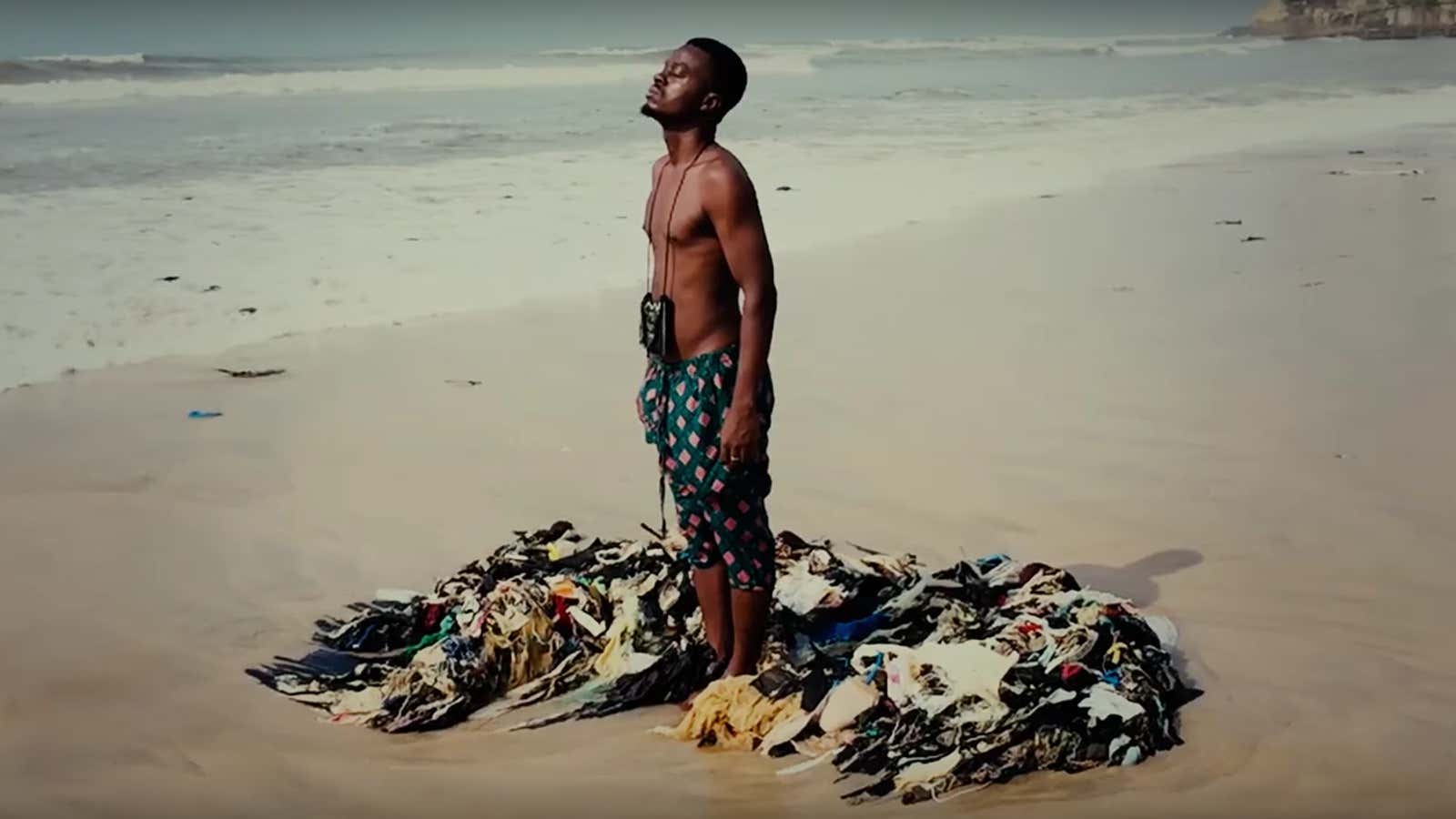Accra, Ghana
In the music video for his song Gold Coast, released last year, Ghanaian rapper ELi stands on Accra’s Labadi beach, as waves and plastic bottles crash against his legs. He walks barefoot across a carpet of plastic bottles and bags, with only hints of sand peaking through. In another scene, ELi stands at attention, his chest poked out, his chin raised, his feet and ankles sunken into a mound of plastic and waste.
ELi, whose full name is Edward Elikplim Ayikoe, belongs to a burgeoning community of Ghanaian musicians who are using their work to interrogate Ghana’s stature as a “model democracy,” in the words of former US president Barack Obama. These artists want to focus attention not on traditional Ghanaian hip-hop themes of financial success, love, and lifestyle, but on other problems that can plague a democracy, like the river of plastic bottles and bags strewn throughout Accra’s neighborhoods and tepid environmental policies that means pollution is rampant. The rappers see their music and platforms as essential to bringing awareness to the crisis.
Towards the end of the Gold Coast video, Ghanaian rapper Wanlov the Kubolor squats, naked, with an image of former president John Mahama’s face censoring his genitals.
Under Mahama’s watch, and now president Nana Akufo-Addo, Accra has become a city drowning in discarded plastic. The city’s system of open roadside gutters, meant to stem heavy rain and flooding during the rainy season, sends excess water into a lagoon that empties into the Gulf of Guinea. But heaps of rubbish often dam up the gutters in Ghana’s poorest neighborhoods, making them vulnerable to flooding. In 2015, the clogging from the accumulating plastic waste and resulting floodwater forced dozens of people to flee their homes. In a tragic accident, 150 people died when a gas station they were using to shelter from torrential rains exploded.
Hip-hop has long been a dominant artistic platform for people to voice their frustrations in pockets of West Africa, with Senegal, Mali, and Gambia enjoying thriving and progressive hip-hop scenes. In Ghana, relative peace has allowed artists to explore other topics like the environment, as well as sexism, unemployment, and the dominance of Christianity, making them incisive musical questioners of the status quo.
Wanlov, who directed ELi’s video, is a half-Ghanaian, half-Romanian who wears long dreadlocks that extend well past his waistline. His real name is Emmanuel Owusu-Bonsu, and he hasn’t worn shoes in 10 years, he says. He usually dons a construction hat to represent the engineers who attend to Accra’s routine blackouts.
“When you come to Ghana and ask who is the most troublesome person—when it comes to social issues, governmental issues and corruption issues—they will say my name,” Wanlov says.
In 2014, Wanlov hosted an environmentally-themed music competition called “Eco Rave.” In the winning song, Keep Ghana Clean, Efo Chameleon, 27, raps over instrumentals from Missy Elliott’s Get Ur Freak On about clogged gutters, the shocking stench, and the widespread negligence that has come to define life in Ghana’s capital. Efo also gives step-by-step instructions for how to dispose of plastic.
Social media and internet-streaming services have allowed artists like Efo and ELi, along with Akan, Worlasi, Azizaa, Kwame Write, and Wanlov’s collaborator Mensa in the group FOKN Bois, the space to be political without having to be trendy.
Traditionally, upcoming musicians here have struggled to get a foothold in an industry run on “payola,” where artists and labels often have to pay DJs and stations to get their music played. But last summer, a group of young music entrepreneurs led by Selorm Jay launched the website Yoyo Tinz (“Simply Hip-hop” in Ghanaian Pidgin English), as a place to celebrate and promote Ghana’s politically and socially-conscious hip-hop artists who are often shut out by the payola system.
“Art is opening the door for a spiritual revolution in Ghana,” Azizaa says.
What sets these artists apart from hip-hop in neighboring countries, is that the burgeoning scene is about more than politics. Their idea of a free and liberated nation is one where yes, the government is accountable, but also the environment is cared for.
Young and upcoming artists, “are the ones addressing the issues; we are the ones coming out of the box,” says rapper Akan. “We are the ones taking the risk, saying if no one’s gonna say it, I’m gonna say it, no matter how much I’ll be spoken against.”
